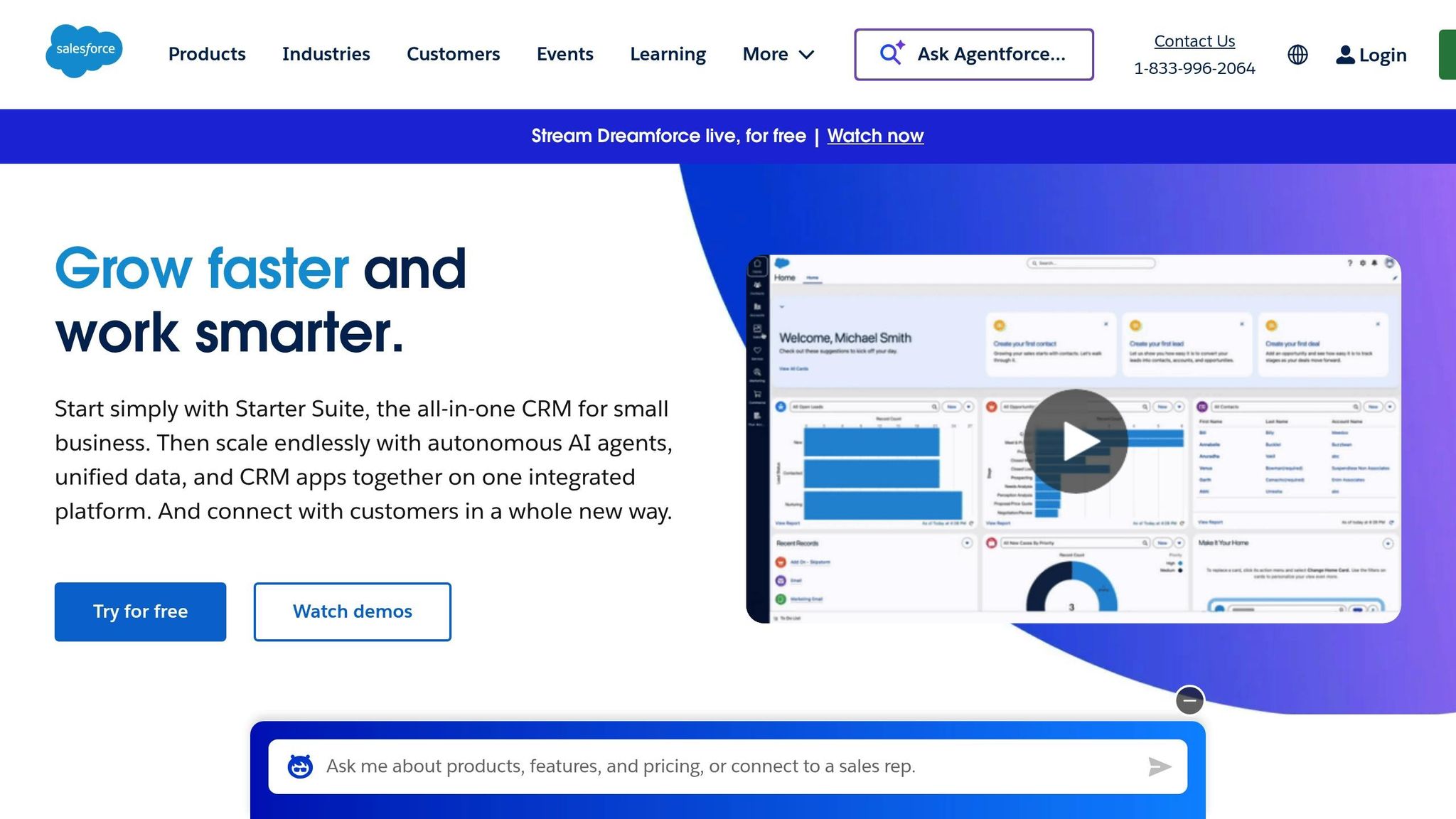
AI-Driven CRM Data Enrichment: Key Benefits | Digital Fractal
AI-driven CRM data enrichment helps businesses improve customer data accuracy, save time, and manage growth more effectively. By automating the process of updating and verifying CRM records, companies can reduce errors by up to 40%, save two hours daily per user, and lower sales costs by 30%.
Here’s why it matters:
- Data Accuracy: AI cross-checks multiple sources, reducing errors compared to manual updates.
- Time Savings: Automation eliminates repetitive tasks, freeing up hours for sales teams.
- Scalability: Handles large datasets effortlessly, even during rapid growth.
- Business Impact: Better data quality leads to improved segmentation, personalized marketing, and higher ROI.
In contrast, manual CRM updates are prone to 20% error rates, require significant employee time, and struggle to scale as businesses grow. Poor data quality can cost Canadian companies an average of CA$12.9 million annually.
For Canadian businesses, investing in AI-powered CRM tools provides a clear path to improving efficiency, cutting costs, and driving better customer engagement.
Introducing Our Salesforce Automated Data Enrichment AI Tool!

1. AI-Driven CRM Data Enrichment
AI-driven CRM enrichment is transforming how Canadian businesses manage customer data. By automatically collecting, verifying, and updating information in real time, these systems eliminate the need for manual input. Unlike traditional approaches, AI continuously scans and refines CRM records, ensuring customer databases remain current and complete. The benefits? Improved data accuracy, significant time savings, scalability, and measurable business results.
Data Accuracy
One of the standout advantages of AI-driven enrichment is its ability to enhance data quality. AI algorithms cross-check multiple data sources and flag inconsistencies, improving accuracy by up to 40% – compared to the 20% error rate often seen with manual methods[2]. For example, leading verification platforms ensure marketing campaigns reach their intended audience by reducing bounce rates. Imagine a customer updates their job title on LinkedIn – AI instantly syncs this change across your CRM, maintaining consistency across all channels. These improvements in accuracy directly lead to smoother workflows and better outcomes.
Time Savings
AI automation is a game-changer for Canadian sales teams, saving them up to 2 hours every day and boosting productivity by 25%. Think of a sales professional in Toronto who used to spend hours researching prospects. Now, they start their day with fully updated customer profiles, ready to focus on closing deals and nurturing relationships. With real-time updates, CRMs are always current, ensuring teams can operate efficiently. These time savings make day-to-day tasks more manageable and support growth as customer bases expand.
Scalability
For businesses experiencing growth, AI-powered enrichment tools handle large datasets with ease. Whether a company is managing hundreds or thousands of customers, these tools maintain high data quality without requiring additional staff. Take a Calgary construction firm, for instance, expanding from 500 to 5,000 customers. Even during periods of rapid growth or seasonal spikes, AI ensures their CRM remains accurate and reliable – no extra manpower needed.
Business Impact
The ripple effects of AI-driven CRM enrichment go far beyond operational improvements. Companies adopting these systems report up to a 25% boost in sales productivity and a 30% reduction in sales costs[2]. Enhanced data quality enables better customer segmentation and more personalized outreach, driving higher conversion rates and better returns on investment. For example, one implementation led to a 25% increase in sales[2]. For Canadian businesses, these tools provide the insights needed to make faster, data-informed decisions and adapt to market shifts with precision.
2. Manual CRM Data Enrichment
Manual updates to CRM data depend entirely on human effort, which often leads to inefficiencies. In many Canadian businesses, employees spend time searching through public sources, business directories, or even reaching out directly to update customer information. These updates are then entered manually into the system, adhering to local standards [2].
Data Accuracy
Human validation, while thorough in some cases, tends to fall short when compared to automated systems. Studies show that manual methods can result in up to 20% errors due to the lack of advanced cross-referencing capabilities [2]. In Canada, compliance with PIPEDA regulations and the need for bilingual data entry add another layer of complexity, increasing the likelihood of mistakes.
Time Savings
Updating CRM data manually is a time-intensive task. Employees often spend several hours each week on this process, which takes them away from their primary responsibilities. By contrast, automated systems can save up to two hours daily per user, freeing up significant time for other tasks.
Scalability
As businesses grow and data volumes increase, manual processes quickly become a bottleneck. These methods not only slow down operations but also lead to higher error rates. For instance, a Canadian company might find that manual updates become unmanageable when over 30% of their B2B contact data becomes outdated each year. To keep up, businesses may need to hire additional staff, which drives up costs and makes the process even less sustainable over time.
Business Impact
The limitations of manual enrichment can seriously undermine CRM effectiveness. Poor data quality leads to unreliable systems, which in turn reduce sales efficiency and discourage CRM adoption. Research indicates that poor data quality costs businesses an average of $12.9 million annually. Sales teams are often reluctant to engage with CRMs that require repetitive, low-value tasks like manual data entry, contributing to system underutilization. This cycle of incomplete or inaccurate data erodes trust in the system, ultimately impacting its role in decision-making and strategic planning.
| Challenge | Manual Impact | Business Cost |
|---|---|---|
| Data Accuracy | Up to 20% inaccurate data [2] | Poor decision-making, missed opportunities |
| Resource Allocation | Several hours weekly per employee | Reduced focus on core activities |
| Scalability | Additional staffing required | Increased operational costs |
| System Adoption | Low user engagement | Wasted CRM investment |
sbb-itb-fd1fcab
Advantages and Disadvantages
Here’s a breakdown of the key advantages and challenges associated with each CRM data enrichment method:
AI-driven enrichment offers automation and accuracy, with real-time updates ensuring that information stays current. This is especially important given that over 30% of B2B contact data becomes outdated annually. However, adopting AI-driven solutions can be costly upfront and may face compatibility issues with existing systems. Additionally, businesses need to regularly monitor these tools to maintain model accuracy and address data privacy concerns.
On the other hand, manual enrichment provides a level of human oversight and control that can be beneficial for managing sensitive data. However, it’s a time-intensive process – employees often spend hours each week on data updates. This method is also prone to human error, leading to inaccuracies in as much as 20% of the data[2]. As the volume of data grows, scalability becomes a major hurdle, often requiring more staff and increasing operational expenses.
For industries in Canada, such as public services, energy, and construction, these scalability challenges are particularly pronounced. Companies like Digital Fractal Technologies Inc have turned to AI-driven CRM innovations to streamline processes, achieving efficiencies that manual methods simply can’t match when dealing with large-scale operations.
The comparison table below highlights the differences between these two approaches:
| Comparison Factor | AI-Driven Enrichment | Manual Enrichment |
|---|---|---|
| Data Accuracy | Up to 40% improvement with nearly 99% email verification[2] | Up to 20% inaccuracy due to human error[2] |
| Time Investment | Saves up to 2 hours per day per user | Requires several hours weekly per employee |
| Scalability | Handles large datasets with ease | Limited by workforce capacity |
| Impact | Boosts productivity by up to 25% and reduces costs by 30%[2] | Poor data quality costs an average of CA$12.9 million annually |
| Implementation | Requires upfront investment in technology | No major technical changes needed |
| Ongoing Maintenance | Automated updates with monitoring required | Continuous manual effort needed |
Ultimately, the choice between these methods depends on a company’s long-term goals and priorities. While manual enrichment may seem convenient in the short term, the time, error, and opportunity costs often outweigh its benefits. Businesses that adopt AI-driven tools frequently report better productivity and more accurate data, showcasing the advantages of automation.
For Canadian businesses, maintaining accurate and up-to-date customer data is critical for fostering strong client relationships and driving sustainable revenue growth.
Conclusion
AI-powered CRM data enrichment offers a game-changing advantage for Canadian businesses. By significantly reducing errors, it addresses a major issue that costs businesses an estimated CA$12.9 million annually. Automation not only eliminates repetitive tasks but also saves up to two hours per user each day and increases sales productivity by 25%. These gains free up valuable resources, allowing teams to focus on strategic priorities and driving both financial and operational efficiency. This makes AI-driven systems an essential tool for navigating Canada’s competitive markets.
Scalability is another key benefit for growing businesses across Canada. Unlike manual processes, which often hit capacity limits and require costly staffing increases, AI systems handle expanding datasets effortlessly. This capability is particularly crucial for industries like energy, construction, and public services, where data volumes can grow rapidly.
For businesses looking to modernize their CRM systems, partnering with experienced providers is a smart move. Digital Fractal Technologies Inc specializes in creating custom CRM solutions and AI-powered tools designed specifically for Canadian industries. Their systems not only ensure compliance with local regulations but also deliver the efficiency and scalability that modern businesses demand. With expertise in workflow automation and digital transformation, they provide the technical backbone needed to implement AI-driven data enrichment seamlessly.
Investing in AI-driven CRM data enrichment isn’t just about improving operations – it’s a strategic decision that positions Canadian businesses for long-term success. By adopting these technologies, companies can boost productivity, strengthen customer relationships, and achieve sustainable growth in today’s data-driven world. AI-powered CRM solutions meet Canada’s unique operational, financial, and compliance needs with precision and reliability.
FAQs
How does AI-driven CRM data enrichment enhance customer segmentation and marketing strategies?
AI-powered CRM data enrichment takes customer segmentation and marketing to the next level by delivering sharper, more current, and detailed customer insights. By sifting through massive datasets and spotting trends, AI ensures your CRM is packed with rich profiles, covering demographics, preferences, and behaviours. This level of detail makes targeting much more precise.
With this improved data, businesses can craft personalized marketing campaigns that truly connect with specific customer groups, boosting both engagement and conversions. On top of that, AI cuts down on tedious manual data entry and minimizes errors, freeing up your team to focus on building real, meaningful connections with customers.
What challenges might businesses encounter when adopting AI-powered CRM solutions?
Adopting AI-powered CRM solutions isn’t always a walk in the park. Companies often encounter challenges like integrating the new system with their existing tools, ensuring their data is accurate and ready for use, and getting their teams up to speed with the technology. On top of that, the initial investment – both in terms of time and resources – can feel hefty, especially for businesses that are new to AI-driven tools.
This is where Digital Fractal Technologies Inc. steps in. They provide tailored AI consulting and custom CRM solutions, guiding businesses through these hurdles. With their expertise, they help organizations transition more smoothly, boosting productivity and improving data accuracy while keeping disruptions to a minimum.
How does AI-driven CRM data enrichment comply with Canadian data privacy laws?
AI-powered tools for CRM data enrichment play a crucial role in helping businesses adhere to Canadian data privacy laws, including the Personal Information Protection and Electronic Documents Act (PIPEDA). These systems can be configured to follow strict privacy measures, such as encryption, anonymization, and access controls, ensuring sensitive customer data is handled with care and remains protected.
On top of that, AI can streamline compliance efforts by automating checks, identifying potential risks, and ensuring data is collected, stored, and used according to legal standards. This not only helps businesses stay aligned with regulations but also minimizes the chances of human error, raising the bar for data security and privacy.

